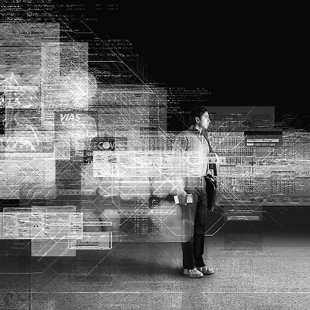Human connectivity to the datasphere comes alive
Terrorist attacks, category five hurricanes, bird flu. These potent threats, which defy laws of conventional defense, are striking unprecedented levels of fear in the hearts of 21st century Americans. But there’s a quiet, more insidious danger out there that threatens everyone, everywhere, every day—electronic identity theft.
Hoping to cast an urgent light on the dilemma, The Builders Association, a New York-based theater company, developed “Super Vision,” a multimedia collaboration with the virtual design studio dbox that explores the rise of digital identity, universal connectivity, and their unintended consequences.
Although personal data management was originally engineered to help us control our lives, “Super Vision” wonders if technology now is controlling us.
Much of what we do, and what we consume, is monitored electronically, stored in vast databases shared by marketers and God knows whom else. Tracked by the swipe of a card, or the click of a mouse, secrets about your income, educational degrees, the magazines you read, your favorite vacation spots, your medications—even whether you prefer boxers or briefs—are ripe for appropriation. All of these data make up a distinctive electronic fingerprint, an indelible portrait of who we are.
Is this a technological marvel or an Orwellian nightmare?
“We are taking a contemporary topic as a point of departure, and using it to explore the larger issues of technology’s impact on us as human beings,” said Marianne Weems, artistic director and co-founder of The Builders Association. “The characters don’t just experience identity theft, but all kinds of relationships to their personal data, which is pictured all around them.”
“Representing the intangible in the project is both the biggest difficulty and the biggest potential for us,” said James Gibbs, director at dbox. “The struggle is to make something that is convincing visually while acknowledging that to depict data always involves making judgments and choices.”
A veritable cauldron of illustrators, photographers, and computer whizzes, dbox has a reputation for concocting a mind-blowing array of visual wonders, including aerial photography and video production for the Freedom Tower at the World Trade Center site.
So, how tricky is it for the design studio, which specializes in commercial projects, to incorporate breathing humans into their virtual universe?
“Super Vision is our third time working with The Builders Association,” Gibbs explained. “Each time we have worked more closely with the actors and have been more intimately involved in the process. Our experience is that human beings, even actors, are much more predictable than computers.”
A cast of talented actors mingles freely among dizzying projected representations of data, layered over images of everyday rooms designed by “Titanic” set master Stewart Liang. The work is punctuated with videos by Peter Flaherty and lighting effects by Jennifer Tipton. Dan Dobson engineered the sound and composed the music, and Constance De Jong wrote the dialogue.
There are three alternating tales that probe how humans fit into the ever-expanding technological landscape. One is about a father, obsessed with manipulating data, who threatens to murder his young son’s virtual identity. Another depicts a foreign traveler’s hurdles thrown up by a series of U.S. customs agents, who learn much more personal information than they should. The third focuses on a techno-obsessed New Yorker caring for a senile grandmother who lives on the other side of the globe.
Not content with merely illustrating data proliferation and abuse, “Super Vision” asks a deeper question, “What forces encourage our permissiveness and engagement in the process of collecting this data and making it public, and what will the results of it be?”
This is a timely question in light of the impending renewal of the controversial U.S. Patriot Act, which, in the name of counter-terrorism, allows the federal government to gather and share sensitive personal data in a way that undermines the civil liberties the law is purported to protect. Every year now, the FBI issues 30,000 letters ordering confidential records from doctors’ offices, banks, and other sources without having to get a judge’s approval, or to notify the person under suspicion.
Of course, there are efforts underway to curb identity theft. A recent visit to a Manhattan office supply superstore revealed that paper shredders now outnumber telephone answering machines. Consumer Web sites have long promised users that they take great care to encrypt personal data to combat theft. But, let’s face it, there are no absolute guarantees, and despite the risks, we continue to blithely fill out those electronic forms and open suspect spam.
The Builders Association is renowned for its experiments in multimedia. Founded in 1994, it broke new theatrical ground with “Master Builder,” a performance event in a gutted Chelsea Loft that used sound effects triggered by the motion of actors. Other large-scale shows have included “Jet Lag,” “Xtravaganza,” and “Alladeen,” “Super Vision” promises to stretch the boundaries of traditional theater even further.
gaycitynews.com


































